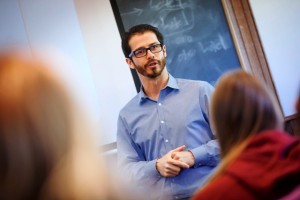Zipolite, the second novel by Daniel Quirós, which he expects to publish soon, tells the parallel stories of the main character, Julio Flores. In the even chapters, Julio returns to Costa Rica after 10 years abroad to contend with his sister’s suicide. In the odd chapters, which take place a year later, Julio travels to Mazunte, a small beach community on the Mexican Coast of Oaxaca to investigate a hidden aspect of his sister’s past.
Julio must not only confront the loss of his sister, but also rediscover the pieces of himself buried under years of indifference and apathetic solitude. Eventually the stories converge, and Julio’s journey becomes “a metaphor for the lost and nonexistent utopia of our youth, and for everything that is born, and destroyed, under time’s passage.”

Professor Daniel Quiros teaches a class in Kirby Hall of Civil Rights.
For Quiros, assistant professor of foreign languages and literatures (Spanish), teaching allows him to develop and articulate complex ideas such as these both as a writer and a scholar.
“A classroom to me is an intellectual community that shares and grows together,” says Quirós. “They say two minds are better than one. Well, imagine 20. Class discussion, student research, and multiple perspectives on films and readings can only strengthen and deepen one’s engagement with cultural texts. Undergraduates at Lafayette are very bright people, and they can help question, revise, and expand my own work. I do a lot of teaching, but I invariably do some learning as well.”
It is no surprise then that Quirós, an accomplished fiction writer, views the development of critical reading and writing skills as essential for students to investigate, question, and critique their world. Ideally, students stop striving to express what they believe their professor wants them to say about issues raised in class and communicate what they actually think.
“I believe that our reality and our identity are mediated through texts,” says Quirós, whose teaching interests include crime fiction and Latin American cinema. “I want to play a part in forming good students, but also good citizens of the world. In relation to Spanish learning, this is very important because it means a development of cultural competency and awareness, as well as a growth in the responsibility to participate in and change the world around us.”
Quirós’ first novel, Verano rojo (Red Summer) (2010), earned the National Literature Prize Aquileo J. Echeverría, Costa Rica’s highest award for literature. The murder of an Argentine café owner in Guanacaste, the northwestern province of Costa Rica, sets the stage for the novel’s exploration of Costa Rica’s declared neutrality during the U.S.-Nicaragua Contra War. The novel also explores the acceptance of neoliberal socioeconomic policies that have stabilized the country economically, but have increased inequality, violence, and crime. As one of the victim’s friends, don Chepe, investigates her murder, he unearths her connection to various guerrilla movements of the 1970s and ’80s. The novel also delves into the famous, but often forgotten, La Penca bombing on the Nicaragua-Costa Rica border in 1984. At its core, Verano rojo challenges Costa Rica’s self-identification as “the happiest country on Earth” or “the Switzerland of Central America.”
Quirós is working on his third novel, Lluvia del norte, a quasi-sequel to Verano rojo, in which the same character will explore the murder of an undocumented Nicaraguan immigrant. Quirós has researched immigration issues extensively, and his findings have inspired the themes for his course Transnational Perspectives: Contemporary Film in the Americas. The first part of the course examines migration through a cinematic perspective. For example, the class will discuss films about migration such as Which Way Home, Los que se quedan, El norte, and Sin nombre.
Quirós also is the author of the short story collection A los cuatro vientos (To the Four Winds) (2009), which he completed as a graduate student at the University of California-San Diego. The stories cover a range of geographic regions—Brazil, northern Mexico, Costa Rica, and southern California—as well as diverse topics. A washed-out thirty something who dreams of bringing the heavy metal band Iron Maiden to Costa Rica. A dog thief who expounds his life views to a fellow bar patron. A play on crime fiction in which a man becomes an accidental detective. A metaphysical reflection based on a voyeur who spends his days spying on his neighbors across the street. All of the stories are linked by their search for a “sense of place and belonging amidst a globalized world shaped by asymmetrical relations of power.”
In May, Quirós will give a presentation at the Latin American Studies Association Conference in Washington, D.C., and this July, he will present at the IV Congreso Centroamericano de Estudios Culturales (IV Central American Cultural Studies Conference) in San José, Costa Rica.

1 Comment
Fabulous!! Daniel, I look forward to reading your work…your are modest but obviously so talented and productive!
Comments are closed.